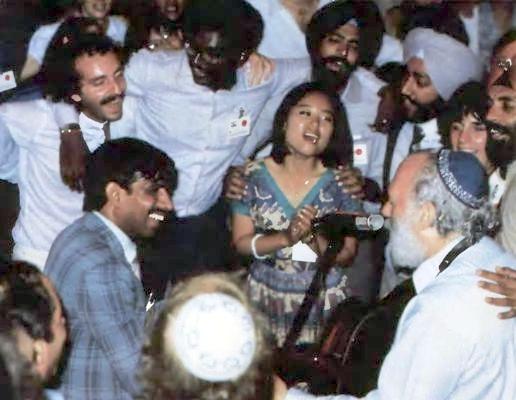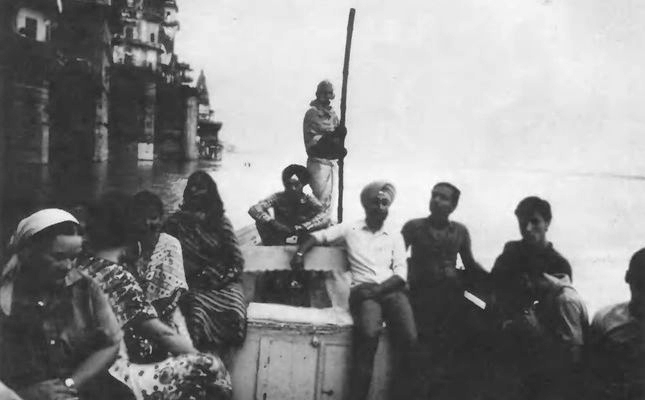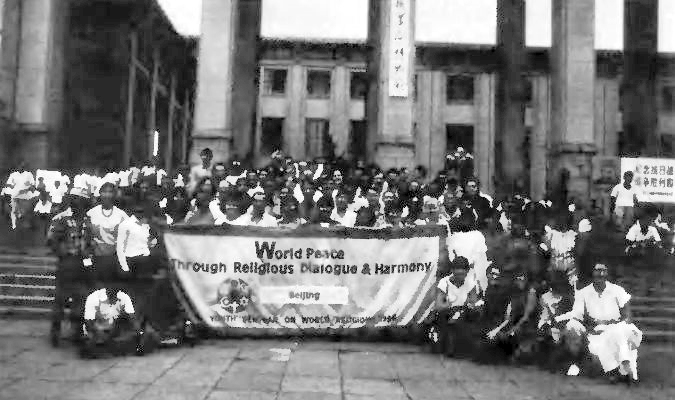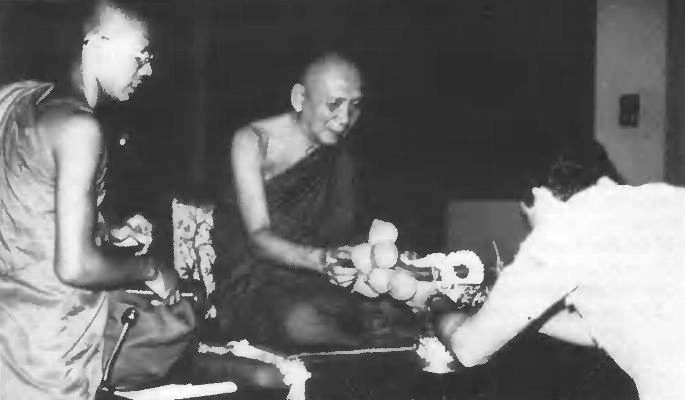![]()
The Words of the Haft Family
|
|
The Words of the Haft Family |

Participants
join Rabbi Schlomo Carlebach in song and dance at a public program in
Jerusalem.
The Youth Seminar on World Religions (YSWR), a venture of the International Religious Foundation, Inc., was founded four years ago through the inspiration of Father. Its purpose is to create mutual understanding and harmony among followers of the different religions of the world.
Each year YSWR selects about one hundred fifty creative university youth and faculty members from a variety of religious, cultural, and national backgrounds. Together they undertake a spiritual journey to the holy and historical sites of the world's religions. Participants find themselves developing relationships and bridging gaps internationally, interculturally, and inter-religiously. This year we traveled to the United States, Israel, Turkey, Italy, India, Thailand, Hong Kong, China, and Korea. In each place we met sincere and well-respected religious leaders and scholars who helped us learn about their traditions and cultures.
The United Nations has designated 1985 as "International Youth Year in recognition of the important contribution young people can make in shaping the future of humanity. So faculty and students of the fourth YSWR felt that this was an especially appropriate year for us to be making our pilgrimage. Our world faces racial prejudice, religious bigotry, and intolerance of all kinds. To overcome these and other problems, the leaders of the future must be armed with the highest of spiritual and moral values. The young men and women on this seminar are in quest of those values and seek a profound renewal of spirit, something they can carry with them throughout their lives to invest into their communities, their countries, and their world.
The participants not only learned about the various world traditions first hand, but in each place they went they made an impact: In a sense the seminar participants are young ambassadors of peace, and together were we a living message of hope for world peace and harmony.
It is Father's hope and vision that through the Youth Seminar on World Religions each youth will be inspired to become a person devoted to bringing about world peace, to honoring the family of humankind and the glory of God, and to developing a deep abundant growth of the spirit. Father also hopes that as a result of YSWR, world religions will seek to make coordinated efforts to meet both the problems of young people and their aspirations.

Boating
down the Ganges in the early morning at Varanasi, India.
Israel does not get a lot of water. The air is hot and dry and most of the land is a sandy brown against a beautiful azure sky. Actually, in seeing the starkness of the land, it is surprising that so many central events in history have taken place here, that so many revelations have been given here, and that such conflicts have raged between civilizations within and over this land.
I went to Israel thinking of it as a Jewish state and I anticipated learning more about Judaism, and I did, but actually during my visit to Israel I had a profound experience with Jesus. In Israel I was personally overwhelmed by a feeling of the centrality of Jesus to history.
I also found the Jewish Israelis to be wonderful people, and I was saddened that there is so little interaction or communication in Israel between the Jews and the Arabs.
We were well received in Turkey. The quality of the people who came to speak to us was quite impressive. Dr. Gulek, who is well known as a linguist, who previously occupied a very high position in the government, and who is perhaps one of the most famous men in Turkey, was a wonderful host to us and really gave a lot of himself. Several professors and deans of theological schools also came to speak with us. It was interesting that, while I felt it was such an honor to be addressed by them, they in fact felt so grateful to talk to a group such as ours, made up of students and faculty from so many different nations.
This was also true of the ecumenical Patriarch of the Greek Orthodox Church. He is such an important man in his church, yet he was so loving and humble towards us. He wished us well at the World Assembly of Religions this fall and praised the Youth Seminar. After speaking to us formally, he spent some time chatting with us.
In Italy we could walk through layers of history, from contemporary times back through the Renaissance, the Middle Ages, and into the Roman era. There definitely is something awe-inspiring and majestic about Rome, whether you're looking at the ruins of the Roman Empire or St. Peter's Basilica or just gazing at the mother churches of the great Catholic orders.
I felt that Italy was a land where the flesh was in perpetual battle with the spirit. The life of St. Benedict in a way represented this. Benedict came to Rome and was so upset by the pleasures of the flesh and the temptations he saw there that he fled to a mountain and lived an ascetic life in a cave for several years. This cave was to be the birthplace of Western monasticism as other ardent believers joined Benedict.
India was a land of shocks and contrasts. Its people's passionate and intense nature is combined with a rich imagination. Thus I felt that the very poor and often devastating external circumstances were in some ways compensated for in the people's rich inner life. This is accented by the tendency in Indian philosophy to treat the inner world as real and the material world as an illusion. Considering that this tradition is thousands of years old and deeply ingrained in the Indian consciousness, it conditions the attitudes of the people in a way that is alien to Westerners. We who hope to be of any help to the country definitely need a deeper understanding of this very complex country.
To some extent there are two worlds in India: one that is strongly traditional and one that has been greatly influenced by and has largely accepted the values of the West. The two exist side by side, and although they are not absolutely exclusive, they are largely alien to one another. Possibly a large part of India's difficulty lies in its inability to find a satisfactory meeting between these two worlds.
Flying out of Calcutta toward Bangkok, I felt I was flying back into the twentieth century. Thailand has very loving, humble, warm-hearted, patient people. Bangkok is a bustling city and its temples are profoundly beautiful.
One of the most moving moments of the entire tour for me was when the tour guide in Thailand told me of the love the Thai people have for their king and queen. Over and over he reiterated that the reason the king and queen are so loved is because they do not live for themselves but for the sake of their people, and they do everything they can to help them and make them happy and proud to be Thais.
We were able to meet some wonderful people there. The acting Supreme Patriarch of Thai Buddhism granted us a private audience in which he expressed his admiration for the work and the goals of the Youth Seminar. The Youth Seminar seemed to represent an even greater hope to this renowned religious leader than it did to the participants. In addition we were welcomed by the deputy governor of the city of Chaing Mai.
In China, many of us were quite impressed by the level of material conditions we saw. There was a lot of construction going on: roads, high-rise buildings, and the like. Everywhere we went we saw piles of bricks. Almost everybody there rides a certain standard type of bicycle. There are no beggars to speak of and there don't appear to be any signs of great hunger. Many of the participants were impressed by what they saw and accredited it to communism, especially in contrast to what we had seen in India.
At the same time the question was raised concerning what motivated the people spiritually. I was particularly interested in this. I asked one of the girls who worked in the hotel what motivated her. She replied in relatively good English that she wanted to work hard for the revolution and make China great. When I asked what would make China great, she answered: "Knowledge:' Many young people are studying not only in schools but from the radio and television. She had learned English by herself with the help of television. She said that she wanted to make China great because many people had left China to live in other countries, and she wanted them to be able to be proud of their motherland.
We heard an interesting lecture by a Harvard professor who has been teaching Confucianism in China. It appears that the Chinese are trying to work out a way in which to use Confucianism in a humanistic interpretation that would be compatible with Marxism. This professor, however, is teaching that Confucianism has a spiritual dimension, and he has been involved in some very exciting and challenging dialogue with other Chinese Confucianists and Marxist-Leninists.
The Chinese guides made sure that we had plenty of time to spend at the government-owned department store.
Korea exceeded all of my expectations. Korea, the land of mountains and rivers, the land of the morning calm, is breathtakingly beautiful. Taking a walk up the hillside on the outskirts of Kwangju, one senses a certain depth to the culture and the tradition of the people. There is sensitivity in the architecture of the houses, in the layout of the land, and in the appearance and ways of the people that can't be put into words. I was glad I had studied at least a little Korean so that I could say a few words.
The blessed members among us were able to participate in the Holy Water Ceremony with the church members in Kwangju. It was very special for all of us. Afterwards we drove with all of the Youth Seminar participants to Father's first church in Pusan and climbed up the hill to the Rock of Tears. The church leader from Pusan spoke to us there. In Seoul we went to the present Chung Pa Dong Church and also to the old Chung Pa Dong Church in which True Parents' Blessing and the Blessings of the 36 and 72 Couples took place. It was a wonderful experience to pray in these places.
The time in Korea was largely a time for reflection, conclusion, and farewell. The final evening we attended a performance of the Little Angels at the Little Angels School. It was the icing of beauty on a cake of love. Dr. Tyler Hendricks, who had given us a talk on Unification- ism in the morning, read to us a speech by Rev. Kwak in which some of the future plans of Rev. Moon and the IRF were outlined. I think that all of the participants were deeply impressed and honored to be a part of such a grand scheme. Many are excited about the prospects of participation in future programs. The reflections of the participants were profound and positive. The Youth Seminar was definitely a journey into a deeper dimension of heart, and the lives of all of us have become irreversibly intertwined.
The next day was our day of departure. There had been many tears already shed, and they continued to fall in profusion. There is still a lot to be digested. Now there are questions to be pursued and much work to be done. Our vision is global, and this experience is only the beginning.
My roommate Sipp, who is a black minister from South Africa, was particularly enthusiastic. He said he had met our members in South Africa, then he had me as a roommate, and then he had met our members in Japan, and he was moved by us all. He said he knew we were truly good. He anticipated that when he met Rev. Moon someday he would find him to be much better than we were because we were his fruits. I told him that I had just been a hippie on the street and that Rev. Moon had brought out my true value, and he said that Rev. Moon was my savior.

The
Youth Seminar on World Religions in Beijing, People's Republic of
China.
We should like to tell you that we were most favorably impressed by the intensity with which the young people of the seminar participated in the encounter we had with them in the parlor of the monastery. Both their words and their behavior spoke to us in a beautiful way of their interest, capacity for reflection, openness to receiving and sharing, and courteous respect. In other words, we felt that each one was truly on pilgrimage in pursuit of new and deeper light and wisdom. Needless to say these are the conditions that are most favorable to the passage of the Spirit of the Lord in us and through us.
Wishing both staff and students every blessing, we remain
Your grateful sisters in Francis and Clare, Assisi
To you alone are we devoted,
Your footsteps are music of joy in
this world.
I have spread as a carpet on your way,
The eye and
the heart of me as your bed.
The full moon dims before your beauty.
Even the
world-illumining sun is like a slave to you.
With the blessing of your auspicious footsteps,
O clouds of
spring,
The world is full, like the garden of heaven, with
blossoms.
True man, who has today the madness for a glimpse:
He indeed is
a king in this world who has a good guide as you are for me.
To sing your praise is delicious for the tongue,
To talk of the
master in this world is delicious.
From any angle the Youth Seminar was a deeply spiritual experience. A large part of the experience was the participants themselves. The mere fact that 140 people of totally different faiths from 39 countries traveled around the world in 7 weeks, no less, due to the sacrifice of hundreds of people to gain over a million dollars to finance the journey even though they themselves did not go on the trip, is a mind-boggling reality in itself. Many of the participants were very sensitive people and, with exceptions of course, were quite humble and appreciative and very curious about any group which would dare to sponsor such an event. There were suspicions of future obligations to the Unification Church at first. But at least in the group I was in, I think by the end most of them realized that the hope and expectation really is for each participant to have a chance to engage in profound soul-searching, because that in itself must necessarily change the world.
I learned that point quite penetratingly over the summer and was amazed as I realized Father's wisdom in initiating this project. Action and change come out of sincere soul-searching in any faith. Digging deeply into one's own faith naturally leads to conversion -- conversion in the sense of change and maturation. Maturation necessarily leads to world harmony. And for an Unificationist, the reality is that the Principle makes exploring the heart of any religion lucid and profound. I think that Moonies have the chance to move very quickly to certain depths because of the perspective the Principle gives us. It also became clear to me (although there was no need to say so) that the end of each of those roads of soul-searching is the True Parents. It was like a crash seminary course where, like my seminary experience, everything testified to God's work in history to restore God's lineage.
The Unificationists on the tour also could share in one aspect of Father's prison experience as well. Like him, we were not allowed to witness directly and had to keep conversation about the Unification Church low-key, but I found that people came with questions about Father, the Unification Church, and the Principle. I even had the experience of several people coming to me for spiritual opinions. One time someone asked my opinion on a Bible passage and it reminded me of Mr. Kamiyama's prison testimony, and then I began to understand.
On this trip the relationship between our ecumenical movement and our direct witnessing became much clearer to me. I find no contradiction or hypocrisy in the two efforts. I see why Father moves with no fear of criticism on this point. It is not a situation of ends justifying the means. Neither one is the goal. Both aspects are crucial to the same goal of building God's Kingdom.
It is a big challenge to share about each country as we return in the midst of the mobilization. Still, I find the two projects, mobilization and world religious dialogue, to be very related. The world is almost bursting with waiting and preparing for True Parents.
The most essential religious experience for me on the trip was the feeling I got for the contribution that all these religions made in providential history. Each one is unique.
The blessing and love I received from God in Korea was almost more than I could handle. Already extremely vulnerable from all the events of the trip, we Unificationists had the added experiences of being with early members, visiting Pusan, taking part in the Holy Water Ceremony, and celebrating Father's release from prison, as well as seeing the profound religiosity of Korea and the beautiful countryside. When I entered my five-star hotel room in Seoul after a long bus ride from Kyongju and saw my suitcase in the room waiting for me (after having lugged it halfway around the world already), I went completely weak and I cried and cried on my knees in the middle of the floor. I couldn't take any more in. It was suddenly so obvious that God's only desire is to bless the world incredibly, without any conditions or obligations, just out of sheer love. Another sister told me later that when she entered her room she felt that Mother had been there to prepare the rooms for us. That kind of puts the experience in a nutshell.

Public
relations director Mel Haft presents a gift to the acting Supreme
Patriarch of Thai Buddhism, Somdaj Nanasamvara.
Our plane landed in Istanbul, Turkey, on a Friday morning. After hurrying through customs, Youth Seminar participants boarded buses and traveled across town to the mosque at Marmara University, to attend the juma, a congregational prayer performed by Muslims every Friday.
As we climbed out of the buses many of us looked at our attire, wondering whether we were properly dressed to enter the mosque. The women were instructed to cover their heads with scarves. Fatima Sachedina, a Muslim whose husband was a Youth Seminar group leader, went around to help the women, securing our scarves: "You must not show any of your hair!' Some Muslim men were washing their arms, feet, and faces at the faucets placed in the courtyard of the mosque. A few participants joined them in performing this ritual.
We entered the mosque as the muezzin began to deliver the azan, or call for prayer, from a minaret outside. The main floor was covered by rows and rows of men, some standing, others kneeling on the carpet. A few male Youth Seminar participants slipped in alongside the Muslims on the main floor while the rest of us climbed to the balcony and knelt or sat, peering through the carved marble railing at the activities below. I felt a very holy spirit there. The imam delivered the khutba, or sermon, first in Turkish and then in English.
The Youth Seminar participants had lunch at the university and then returned to the mosque for an introductory lecture on Islam. Then we were free to walk around the university or stay to observe the afternoon namaz, or prayer. Having heard the deep experiences that some participants had had praying alongside the Muslims on the main floor, some of the women asked Fatima, "Couldn't we pray on the main floor with the men?" She explained that the balcony in the newly- built mosque had been added to accommodate the women, and that it is allowable for the women to pray on the main floor behind the men only if there is room. We said we couldn't see the imam very well from the balcony and couldn't follow the prayer very easily from there. So Fatima said, "Just wait here a moment;' and went to her husband, Dr. Sachedina, to plead on our behalf. Dr. Sachedina spoke with the imam and arranged for us to observe the namaz on the main floor.
The women participants followed Fatima to the building where the Muslim women perform wuzu, or ablution, which is the washing of the limbs in preparation for prayer. She called out, "Quickly, quickly, there isn't much time before prayer begins!" I'm sure that this group of 25 women, representing a vast variety of races and cultures, must have been quite a sight, scurrying along the path outside the mosque. As Fatima explained the procedure to each of us we ran to the sinks, calling out, "Am I doing this right?" or, "What do I wash first, my right arm, or my left?" Fatima never seemed to lose patience as she answered our questions and encouraged us, "You're doing fine!" She tied our scarves as best as she could again to cover our hair, and finally looked at the finished product: a group of women who were obviously not Muslim, but had tried their best to prepare for prayer. She smiled. "Well, now you look like Muslim women!"
We hurried into the mosque and knelt either beside Fatima or behind her, waiting to begin. The men were at the front of the mosque and could not see us, but the newspaper photographers who had followed us from the airport did, and they quickly took pictures of this unusual, diverse group of women. We were silent as the imam began, and although we did not know the reasoning behind all the movements and the meaning of the Arabic words, we watched and followed, kneeling and bowing as the prayers were murmured.
Certain impressions have remained in my mind and heart since my first encounter with Islam: the amazement of hearing a public call for prayer in the streets, and watching rows of people bowing in unison before God. My own heart is moved to see such respect and humility before Heavenly Father. I also learned that it is not enough to study a religion and have interfaith dialogue with its believers. To understand the heart of a religion we must also be able to touch the spirit, the mystical core of faith. Even though we may not agree in doctrine, by doing this together we can meet the heart of God.